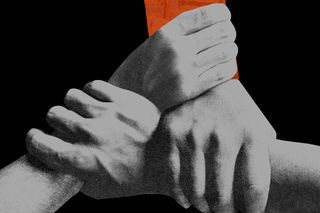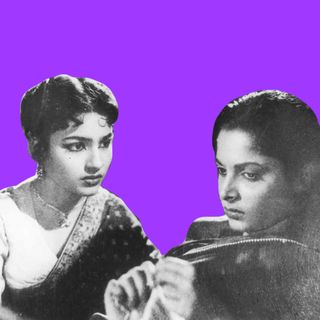.jpg?rect=0,80,1280,1280&w=320&h=320&fit=min&auto=format)
Uttarakhand's Rules on Live-In Relationships, Explained
The Code mandates the obligatory registration of all live-in relationships – couples must submit a statement to the registrar of the state, even residents of Uttarakhand living outside of state boundaries.

Yesterday, the Uttarakhand State Assembly ratified the state’s controversial Uniform Civil Code Bill. The Bill had been proposed only the previous afternoon by its Chief Minister Pushkar Singh in the BJP-ruled assembly amid resounding slogans of “Jai Shri Ram” and “Bharat Mata ki Jai.”
BJP members from other states, such as Gujarat, Uttar Pradesh, Assam, and Madhya Pradesh, have expressed their support for the legislation, stating intentions to adopt similar measures. The party members have referred to Uttarakhand as the “test state” for this model.
The one-hundred-ninety-two page long document seeks to “govern and regulate the laws related to marriage and divorce, successions, live-in relationships, and matters related thereto.” Now ratified, the state will become the first ever in the country to implement the long-debated Uniform Civil Code (UCC), which has been part of the BJP’s election manifesto for a long time. The unexpected passing of the Bill has stirred up much debate, fueling heated discussions across social media.
The Code includes schedules that implement a complete ban on bigamy and polygamy, standardization of marriage age for women from all faiths, standardization of divorce procedures for all men and women, and compulsory registration of marriage. Perhaps the most controversial schedule makes it “obligatory for partners in a live-in relationship within a State, whether they are resident of Uttarakhand or not, to submit a statement of live-in relationship under sub-section (1) of section 381 to the Registrar within whose jurisdiction they are so living.”
“That historic moment is near for Devbhoomi when Uttarakhand will become a strong pillar of Prime Minister Narendra Modi’s vision of ‘Ek Bharat, Shresth Bharat’,” said CM Dhami.
The Code mandates the obligatory registration of all live-in relationships – couples must submit a statement to the registrar of the state, even residents of Uttarakhand living outside of state boundaries. This implies that those in live-in relationships, or intending to get into one, need to submit a statement to the state registrar, who will then carry out an inquiry before approval. This inquiry could involve providing additional information or evidence or being summoned for in-person verification.
We Asked Six Experts to Explain the Impact of a Uniform Civil Code in Modern India
After conducting the inquiry, within 30 days of receiving the couple’s statement, the registrar will then either register the relationship and issue a certificate or refuse to register the statement. The Code mandates that the registrar has to forward a statement of the live-in relationship to the in-charge of the local police station for record and, in case either of the partners is younger than 21 years of age during the time of registration, the police must also inform the parents or guardians of such partners. A similar inquiry process will be undertaken if one or both partners want to “terminate” the live-in relationship.
Moreover, the Code criminalizes any non-compliance, stating that anyone in a live-in relationship for more than one month without submitting a statement shall be convicted by a judicial magistrate with imprisonment up to three months and/or a fine not exceeding Rs 10,000. If an individual is deemed to have submitted false information or withheld information during registration, they would also face a jail term of three months and a fine of Rs 25,000. If any of the partners fails to submit the statement of live-in relationship on being required by a notice, they shall face a jail term of six months and Rs 25,000 fine.
The Code empowers the registrar to examine the statement submitted by prospective live-in partners, conduct an “enquiry” to check if the relationship between the couple is not a “prohibited” one.
The UCC Bill also declares that a child of a live-in relationship shall be a legitimate child of the couple and mandates that, in-case a woman gets deserted by her live-in partner, she shall be entitled to claim maintenance from her partner. By doing so, the bill effectively assimilates live-in relationships – a discretionary, consensual, and secular form of cohabitation – into the conventional framework of marriage.
Upon first glance, this looks like a positive step – so far, live-in relationships have not been legally recognised, which in turn meant couples couldn’t enjoy the same legal rights or protections as married couples. They remained outside the scope of any legal recourse and entitlement to property rights, inheritance, or maintenance in case of separation. However, several past court verdicts have already held that live-in relationships are neither immoral nor illegal.
How Does the Law Protect People in Live‑in Relationships?
But the fact that live-in relationships will only be legitimized if considered so by the registrar raises many concerns and questions. Mainly: why is the State so anxious to regulate them by way of registrations and punishments?
Live-in relationships provide an alternative avenue for individuals who do not wish to enter into traditional matrimony and those who have been deliberately sidelined from it. Lying outside the traditional norms of marriage, the existence of living-in relationships is transgressive of the culture’s sensibilities – it presents the possibility of re-imagining an intimate space beyond the sanctimonious dictates of matrimony.
The mainstream critique of live-in relationships assumes it to be a perverted consequence of excessive “westernization”. The State, which stands as an extension of the “family unit’’ derives its legitimacy from androcentric and gerontocratic authority of traditional values and religious morality. Thus, in a state that is built according to the ideology of Hindutva nation, a homogeneous and “uniform” culture becomes desirable. To do so, it must police any threats to its legitimacy that might destabilize its position as the locus of power. Sociologist Rajni Palriwala calls this “stratified familialism,” where the family values are formally institutionalized, appropriated by the State and dispersed into the socio-political culture of society.
This censure on live-in relationships – which symbolize a deviation from culturally dictated values – thus makes sense. It lays bare the anxieties of the State and its need to mediate the space of personal relationships.
The Indian state, mostly made up of Savarna Hindu men, has consistently been hyper vigilant of other masculinities – especially ones that are Dalit or Muslim. “Anti-romeo squads,” led by men from Bajrang Dal, routinely re-emerge around Valentine’s Day to “protect” the modesty of Hindu women and, by extension, the honor of their own communities. This is a smokescreen veiling their anxieties around women from their caste-group or faith being “seduced” by “outsider” men, which is seen as undermining their masculine Hindutva nationalism.
“Male and female bodies as well as societal ideas defining cultural interpretations of masculinities and femininities are potent metaphors for expressing the nation,” writes political scientist Sikata Banerjee. The existence of live-in relationships offsets the ideal of the Hindu family within which the image of the nation is embedded. A main reason for this is the freedom and autonomy such relationships afford women. A free woman goes against the virtue of a pure female in the ideal Hindu family, evoking ideas of shame associated with sexual respectability. Moreso, the idea of an Indian woman – by default a Savarna Hindu woman – whose chastity and sacrifice lends to the vision of a unified Bharat falling in love with a Muslim man can rattle the strongest pillars of such a nationalism. This is the very narrative which feeds the trope of “Love Jihad,” which has been gaining momentum since 2014. This anti-Islam hostility has solidified in a discourse of suspicion that defaults to the construction of a “predatory Muslim man.”
Studies indicate that, in India, only 10% of marriages are inter-caste while only 2% are inter faith. Considering the animosity and violence faced by inter-caste and inter-faith couples, live-in relationships offer a relatively alternative, safe, and private space for relationships to exist in. Further, with same-sex marriage still not legalized, live-in relationships also become the last and only resort for queer couples to access companionship, intimacy, and comfort. The UCC Code threatens all this in what seems to be an attempt to reinstitute a heteronormative, Hindu family as the only viable model, displacing the existence of any other.
As one post on X highlighted, this legislation will create big hurdles for queer and straight people alike. The excessive documentation process and heightened surveillance will lead to all unmarried individuals being unable to secure accommodation in housing complexes, which are mostly made of neighborhoods of upper-middle-class Savarnas. Moreover, since the Code applies to even residents of Uttarakhand who have migrated to other states, it renders null and void the privacy and anonymity sought by those who leave their hometowns to escape unnecessary judgment.
Beyond the ramifications on live-in relationships, the proposed implementation of the UCC also signals a disconcerting departure from its initial vision as a vehicle for secular progress.
The origins of the Uniform Civil Code lie in the efforts of the women behind the Indian Constitution. Leaders like Hansa Mehta, President of the All India Women’s Conference during the drafting committee’s debates in 1946, staunchly advocated for a transformative legal reform to undo “social evils” by secularizing the realm of religion. The original UCC Bill, as proposed, was to be so progressive that it would be acceptable to all sections of the Indian society, underscoring its inclusivity with the term “common.” Moreover, they maintained that if such a Bill was ever legislated upon, its status must remain “optional,” following from the constitutional ideals of equality and non-discrimination.
Yet with the current Code, the emphasis has shifted away from the “secular” model of a UCC. In doing away with the provisions of the Sharia Law which govern the personal law practices of polygamy, Halala, Iddat, and Triple Talaq while also making them punishable offenses, the Bill claims to have brought justice and liberation to the Muslim women.
However, “the standard Western vocabulary of oppression, choice, and freedom is too blunt to describe these women’s lives,” writes anthropologist Lila Abu-Lughod in her book Do Muslim Women Need Saving.
UP Police Investigation of ‘Love Jihad’ Concludes What We Already Know — It Doesn’t Exist
Voicing his concern over the Code, Jamiat Ulama-i-Hind’s President Maulana Arshad Madani says that the, “UCC was in conflict with the fundamental rights given to citizens.” Commenting on the exclusion of STs from the UCC, Madani asked that if tribal communities can be exempted from the law then “why religious freedom cannot be given to us [Muslims] under Sections 25 and 26 [freedom to profess, practice and manage religious affairs] of the Constitution, recognising the fundamental rights of citizens.”
Throughout the years, Hindu personal laws have undergone legislative reforms targeting practices like sati, dowry, and child marriage. This in turn has given way to a growing anxiety among those aligned with right-wing political and cultural ideologies, who perceive these reforms as disproportionately targeting Hindu traditions and Hindu men.
Milan Vaishnav, a political economist, argues, “The BJP’s electoral resurgence of late has once more brought an alternative nationalism to the fore, one based not on secular principles but rather on the premise that Indian culture is coterminous with Hindu culture.”
The cultural landscape envisioned by this Code not only establishes a disconcerting precedent for overruling minority rights but also emboldens the State to interfere in the deeply personal realms of sexuality and personal laws.
Granting discretionary powers to registrars to reject applications for cohabitation only amplifies concerns of power abuse and individual autonomy infringement. It exposes already vulnerable couples to severe ramifications from their families, in cases where the police decide to “intimate” the guardian or “summon” an unsupportive kin as “witness.”
This heavy-handed approach not only breeds a culture of unnecessary state surveillance and coercion but also undermines the secular and reformative objectives of the Uniform Civil Code. Through the imposition of an austere and parochial public morality, the government can factor out those who diverge from its prescribed standards, imperiling fundamental rights such as privacy, freedom of expression, and self-determination. This risks corroding the bedrock of democracy and civil liberty.
Naina is a sociology graduate of the Delhi School of Economics. She presently works as a writer focusing on queer theory, culture, media semantics, and women's health.
Related
.jpg?rect=0,80,1280,1280&w=320&h=320&fit=min&auto=format)

Woe Is Me! “My Concerned Friend Is Telling Others About My Issues. Should I Confront Her?”
